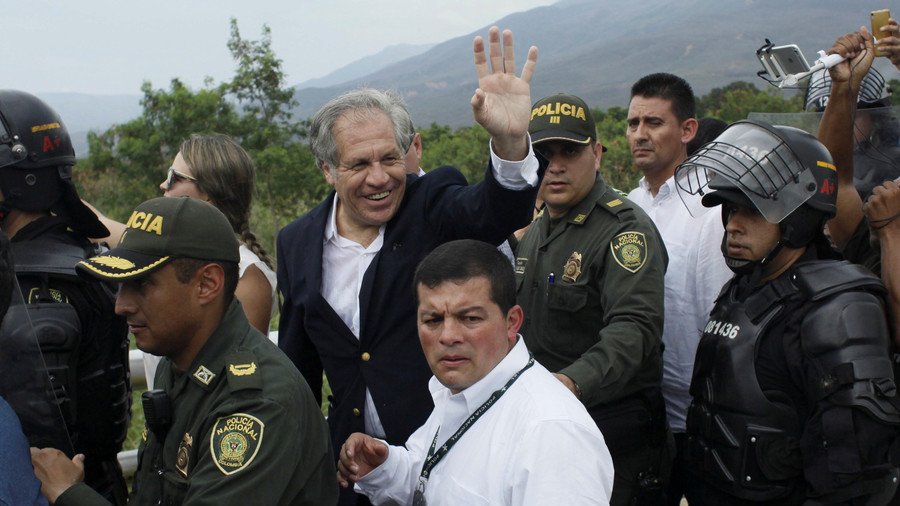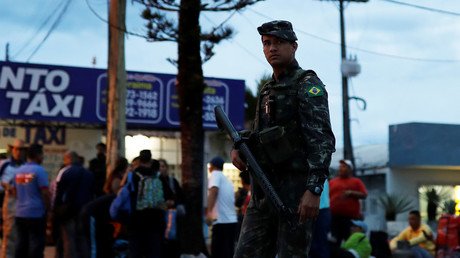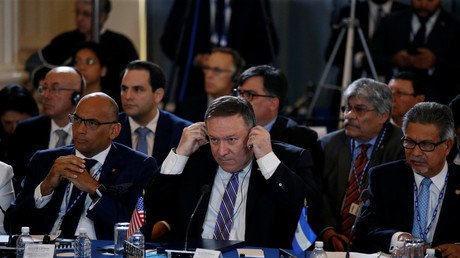Military intervention in Venezuela ‘on the table,’ says OAS secretary general

The head of the Organization of American States (OAS), accused by Venezuelan President Nicolas Maduro of being a “CIA agent,” says military intervention against Caracas should not be ruled out as a response to the ongoing crisis.
OAS Secretary-General Luis Almagro has hinted that the bloc may consider taking military action in Venezuela if it runs out of diplomatic options in its bid to alleviate the plight of people in the crisis-stricken country.
“With regards to a military intervention aimed at overthrowing the regime of Nicolas Maduro, I think we should not exclude any option,” Almagro said on Friday.
Venezuelans have been fleeing to neighboring countries in droves due to shortages of food and water, as well as soaring inflation and unemployment at home.
Almagro was wrapping up his three-day trip to Colombia, which has been heavily impacted by the inward movement of refugees from Venezuela. Some 3,000 Venezuelans are estimated to be crossing into the country every day. Brazil, Peru, Ecuador and Chile have also been sharing the refugee burden, with Brazil deploying troops to the border to restore order in the borderline state of Roraima after fierce clashes erupted between locals and migrants.
Almagro has frequently traded verbal blows with Maduro. Speaking in the Colombian border city of Cucuta on Friday, the OAS chief called the Venezuelan leader a “dictator” and Cucuta “the city that best exemplifies the lies of Venezuela’s dictatorship.”
The comments come shortly after an explosive report in the New York Times, which claimed that the administration of US President Donald Trump has long conspired with a group of Venezuelan officers to depose Maduro. The clandestine negotiations, which involved US officials engaging with a military commander on their own sanctions list, reportedly kicked off in autumn 2017 and continued throughout last year.
According to the NYT, US officials eventually decided not to endorse the plotters, who had asked their US handlers to provide them with material supplies, including encrypted radios.
When confronted with the report, the White House did not outright deny that it had been engaged in secret talks with mutinous officers. “The United States government hears daily from the concerns of Venezuelans from all walks of life – be they members of the ruling party, the security services, elements of civil society or from among the millions of citizens forced by the regime to flee abroad,” the White House National Security Council (NSC) said in a statement.
Almagro and Maduro have been embroiled in a long-running war of words, exchanging insults and calling each other “traitors.” Back in 2016, Maduro accused Almagro of being a “CIA agent” and of turning the OAS into a US pawn. The OAS chief then fired back, denying that he was with the CIA and accusing Maduro of slander. “And your lie, even if it repeated a thousand times, will never be true,” he wrote at the time.
The US has been pushing for the suspension of Venezuela from the OAS, with US Secretary of State Mike Pompeo urging members to kickstart the procedure so it “would send a powerful signal to the [Venezuelan President Nicolas] Maduro regime.”
At the organization’s 48th assembly in June, Washington failed to secure enough votes needed for the proposed suspension, which was celebrated as a victory by Caracas.
Venezuela, however, wants to leave the bloc on its own terms. Back in 2017, it formally started a withdrawal procedure and will cease to be a member by 2019.
Like this story? Share it with a friend!















